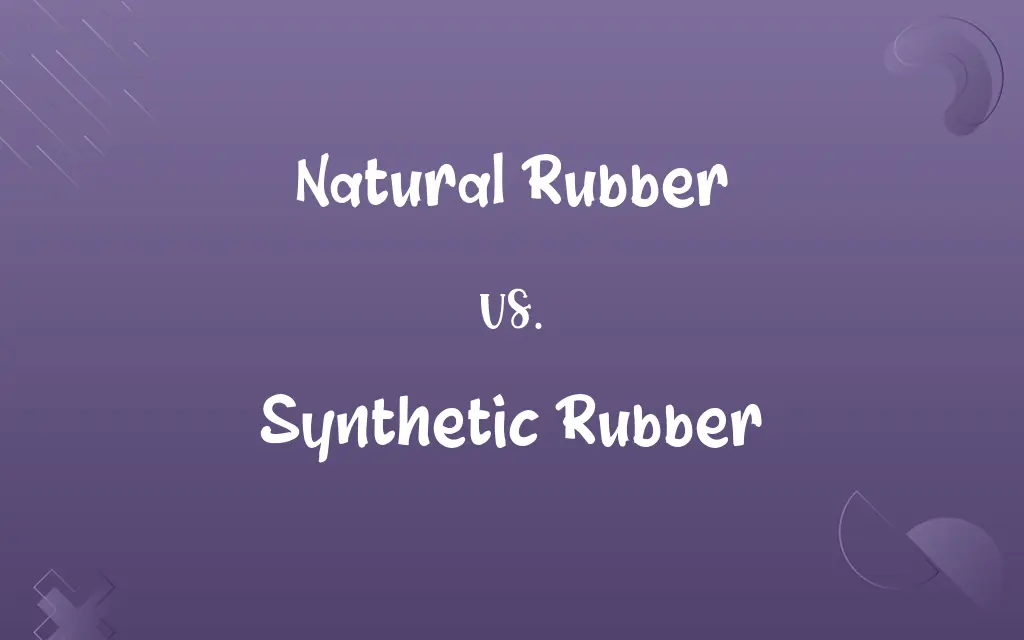Natural Rubber vs. Synthetic Rubber: Know the Difference

By Hifza Nasir & Shumaila Saeed || Published on March 8, 2024
Natural rubber, derived from the latex of rubber trees, offers elasticity and resistance to abrasion, while synthetic rubber, produced from petroleum byproducts, provides enhanced chemical and temperature resistance.

Key Differences
Natural rubber is harvested from the Hevea brasiliensis tree, where the latex sap is tapped and processed. This rubber is highly valued for its superior elasticity, tensile strength, and resilience, making it ideal for products like tires, gloves, and elastic bands. On the other hand, synthetic rubber is manufactured through the polymerization of petroleum byproducts, resulting in a variety of types such as styrene-butadiene rubber (SBR) and neoprene, each with specific properties tailored to different industrial applications.
Shumaila Saeed
Mar 08, 2024
While natural rubber is renowned for its ability to stretch and return to its original shape, providing a high level of comfort and flexibility, synthetic rubber is engineered to exhibit specific characteristics, such as resistance to oils, chemicals, and extreme temperatures. This makes synthetic rubber indispensable in applications where durability under harsh conditions is crucial, such as in automotive seals and hoses.
Hifza Nasir
Mar 08, 2024
The production of natural rubber is dependent on climatic conditions and the availability of suitable land for rubber plantations, making it susceptible to fluctuations in supply and price. Conversely, synthetic rubber production can be controlled and scaled according to demand, offering a more stable supply chain for industries reliant on rubber components.
Hifza Nasir
Mar 08, 2024
In terms of environmental impact, natural rubber is considered more sustainable, as it is derived from a renewable resource and is biodegradable. However, the cultivation of rubber trees can lead to deforestation and biodiversity loss if not managed responsibly. Synthetic rubber, while providing consistency and versatility, is derived from non-renewable petroleum sources, raising concerns about pollution and resource depletion.
Hifza Nasir
Mar 08, 2024
Both natural and synthetic rubber play vital roles in modern industry. Natural rubber's unmatched elasticity and resilience make it irreplaceable in certain applications, whereas the customizable properties of synthetic rubber allow it to meet the specific needs of diverse applications, from medical devices to automotive components.
Hifza Nasir
Mar 08, 2024
ADVERTISEMENT
Comparison Chart
Key Properties
High elasticity, tensile strength
Tailored chemical, temperature resistance
Hifza Nasir
Mar 08, 2024
Environmental Impact
Renewable, biodegradable
Non-renewable, pollution concerns
Hifza Nasir
Mar 08, 2024
ADVERTISEMENT
Natural Rubber and Synthetic Rubber Definitions
Natural Rubber
Elastic material derived from the latex of rubber trees.
Natural rubber is extensively used in the manufacturing of tires due to its flexibility.
Shumaila Saeed
Mar 05, 2024
Synthetic Rubber
Customizable for specific industrial needs.
Synthetic rubbers can be engineered to have varying degrees of hardness and flexibility for different applications.
Hifza Nasir
Mar 05, 2024
Natural Rubber
Subject to price fluctuations based on supply.
The price of natural rubber can vary significantly due to changes in weather and demand.
Shumaila Saeed
Mar 05, 2024
Synthetic Rubber
Consistent supply not affected by natural factors.
The production of synthetic rubber can be adjusted to meet market demand, ensuring a stable supply.
Hifza Nasir
Mar 05, 2024
Natural Rubber
Biodegradable and considered more sustainable.
Natural rubber products decompose over time, reducing environmental waste.
Hifza Nasir
Mar 05, 2024
ADVERTISEMENT
Synthetic Rubber
Rubber produced through chemical synthesis of petroleum byproducts.
Synthetic rubber is used in making waterproof seals due to its resistance to water and chemicals.
Shumaila Saeed
Mar 05, 2024
Natural Rubber
Requires specific climatic conditions for cultivation.
Rubber plantations thrive in the tropical climates of countries like Thailand and Indonesia.
Hifza Nasir
Mar 05, 2024
Synthetic Rubber
Offers enhanced resistance to chemicals and temperature.
Neoprene, a type of synthetic rubber, is commonly used in wetsuits for its thermal stability.
Hifza Nasir
Mar 05, 2024
Natural Rubber
Known for high tensile strength and abrasion resistance.
The durability of natural rubber makes it ideal for high-stress applications like conveyor belts.
Hifza Nasir
Mar 05, 2024
Synthetic Rubber
Derived from non-renewable resources.
The production of synthetic rubber relies on the availability of petroleum, a finite resource.
Shumaila Saeed
Mar 05, 2024
Repeatedly Asked Queries
Can synthetic rubber replace natural rubber?
While synthetic rubber can substitute natural rubber in many applications due to its customizable properties, certain uses still require the unique characteristics of natural rubber.
Hifza Nasir
Mar 08, 2024
Why is synthetic rubber important?
Synthetic rubber's ability to resist chemicals, oil, and extreme temperatures makes it essential in industries requiring durable materials under harsh conditions.
Hifza Nasir
Mar 08, 2024
How is synthetic rubber made?
Synthetic rubber is produced through the chemical polymerization of petroleum byproducts, tailored to have specific properties for diverse applications.
Hifza Nasir
Mar 08, 2024
What is natural rubber?
Natural rubber is a flexible, elastic material derived from the latex sap of rubber trees, used in various applications for its tensile strength and resilience.
Shumaila Saeed
Mar 08, 2024
Can the properties of synthetic rubber be customized?
Yes, synthetic rubber can be engineered to meet specific requirements of hardness, flexibility, and resistance to various factors.
Dua Fatima
Mar 08, 2024
Is natural rubber environmentally friendly?
Natural rubber is renewable and biodegradable, but its production must be managed responsibly to avoid deforestation and biodiversity loss.
Shumaila Saeed
Mar 08, 2024
Is there a significant cost difference between natural and synthetic rubber?
Costs can vary depending on market demand, production costs, and availability of raw materials, with fluctuations more common in natural rubber due to its dependence on climatic conditions.
Hifza Nasir
Mar 08, 2024
How do synthetic and natural rubber compare in terms of performance?
Performance depends on the application; natural rubber is preferred for its superior elasticity, while synthetic rubber is chosen for specific resistance properties.
Dua Fatima
Mar 08, 2024
How do climate conditions affect natural rubber production?
Natural rubber production depends on tropical climates, and adverse weather can significantly impact supply and price.
Hifza Nasir
Mar 08, 2024
What are the environmental concerns with synthetic rubber?
Production relies on non-renewable petroleum, contributing to pollution and resource depletion.
Shumaila Saeed
Mar 08, 2024
What steps are being taken to make rubber production more sustainable?
Initiatives include responsible land management for natural rubber cultivation and research into bio-based feedstocks for synthetic rubber.
Dua Fatima
Mar 08, 2024
Which rubber is better for automotive tires?
Both types are used in tires; natural rubber for its elasticity and resilience, and synthetic rubber for its durability and resistance to wear.
Hifza Nasir
Mar 08, 2024
Share this page
Link for your blog / website
HTML
Link to share via messenger
About Author
Written by
Hifza NasirCo-written by
Shumaila SaeedShumaila Saeed, an expert content creator with 6 years of experience, specializes in distilling complex topics into easily digestible comparisons, shining a light on the nuances that both inform and educate readers with clarity and accuracy.








































































